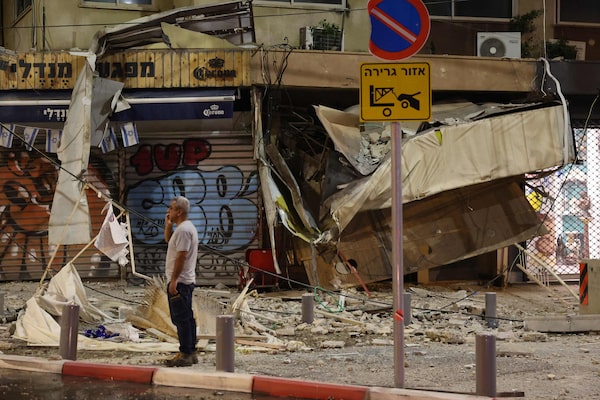
A man stands in front of a damaged shop in Tel Aviv after it was hit by a rocket fired by Palestinian militants from the Gaza Strip on Oct. 7.Jack Guez/AFP via Getty Images
As Israel heads into war against Hamas, its vaunted spy agencies are under a cloud because they were unable to provide proper warnings that the militant Palestinian group would launch a devastating surprise strike out of the Gaza Strip.
Israeli forces were not expecting the massive assault by gunmen who suddenly overwhelmed the southern border on Saturday, killing hundreds and taking dozens of captives, including civilians.
“It would be hard to view this situation as not having been an intelligence failure,” Jonathan Panikoff, a former deputy national intelligence officer for the Near East at the U.S. government’s National Intelligence Council, said in an interview.
“They failed spectacularly,” a retired member of the Central Intelligence Agency, Marc Polymeropoulos, told The Globe and Mail.
EXPLAINER: What we know so far about Hamas’s attack, Israel’s response and international reaction
Israelis recount terrified flight as Hamas gunmen attack dance party
Mr. Polymeropoulos, a former CIA senior operations officer, noted that no red flags were raised by the intelligence agencies of countries with whom Israel’s services have liaison contacts in the region such as Egypt, Saudi Arabia, Jordan or Qatar, which also has a conduit into Gaza through its financial aid.
“How all of these intelligence services missed this is frankly shocking to me. Perhaps we have underestimated the capabilities of Hamas, their counter-intelligence practices, because it’s pretty incredible that this was not picked up anywhere,” he said.
The Gaza Strip is not a large territory – it has a total area that is smaller than the island of Montreal. “It’s a tiny area and the thinking was that Israel along with Egypt and others had that place absolutely covered in every facet. And it’s clear that wasn’t correct,” Mr. Polymeropoulos said.
OPINION: The Israel-Gaza war will have grave repercussions in the Middle East and beyond
Mr. Panikoff, who is director of the Scowcroft Middle East Security Initiative in Washington, noted that Hamas conducted an “extremely well-planned and well-prepared attack” where militants breached Israel’s defences on foot, by boat and even by flying motorized paragliders.
The scale of the assault immediately fuelled suspicions that Hamas had assistance from Iran. Hamas spokesperson Ghazi Hamad confirmed to the BBC on Sunday that the group had direct backing for the attack from Tehran.
“An operation this complex, which was really multi-domain, from the air, land and sea, would have a huge footprint. It would take months if not, maybe a year to plan. It would involve training. It would involve explosives, weapons, huge logistics,” Mr. Polymeropoulos said.
Canadian among hostages held in Gaza amid Hamas attacks on Israel, former cabinet minister says
Officials looking into report that a Canadian is dead after Hamas attack on Israel
For the Israelis, the main responsibility for collecting information from Gaza would lie with its military intelligence and Shin Bet, the country’s domestic security service.
But, Mr. Polymeropoulos said, Mossad, Israel’s foreign intelligence service, would have to bear some responsibility for the blunder if it had failed to detect the Iranian involvement in the operation.
Collecting intelligence typically comes from three main pipelines, Mr. Polymeropoulos said: human sources such as informants; communications intercepts; and sensors at the border.
The attack now raises questions about whether Israel’s human sources were either fed false information or acting as double agents, he said.
He added that, even with their credibility in doubt, Israel’s intelligence services now have to carry on, to assist the military in identifying Hamas targets, in trying to locate captured Israelis, and in documenting Iran’s degree of involvement.
Eventually, Israel will have to determine how its spies fumbled, he said. “One is they missed it entirely. Or two, it was collected and it was not disseminated properly, it was not analyzed properly or if it was, it was discounted,” Mr. Polymeropoulos said.
“Given the amount of intelligence and security assets that Israel has had against Gaza for a long time, there will be a full-scale review when the military operation is over … fundamentally to make sure it never happens again,” Mr. Panikoff said.
 Tu Thanh Ha
Tu Thanh Ha